The book Emergency Sanitation: Assessment and programme design has been produced to assist those involved in planning and implementing emergency sanitation programmes. The main focus of the book is a systematic and structured approach to assessment and programme design. It provides a balance between the hardware (technical) and software (socio-cultural, institutional) aspects of sanitation programmes, and links short-term emergency response to long-term sustainability. The book is relevant to a wide range of emergency situations, including both natural and conflict-induced disasters, and open and closed settings. It is suitable for field technicians, engineers and hygiene promoters, as well as staff at agency headquarters.
Archives
Emergency Sanitation (WEDC, 2002)

D-407/2015a Post Emergency Institutional Latrine (Fully Lined Desludgable Latrine With Raised Option) Design and BoQ (UNHCR, 2015)
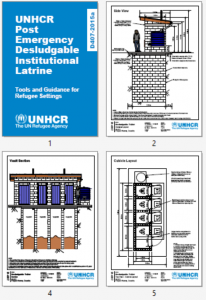
This document contains documentation to help UNHCR and WASH actors build desludgable institutional latrines in refugee settings. The package includes: Technical Drawings; Step by Step Construction Drawings; Bills of Quantity; Material and Workmanship Specifications; and Design Calculations.
D-406/2015a Urine Diverting Dry Toilet (Raised, Alternating Dry Vault Toilet) Design and BoQ (UNHCR, 2015)

This document contains documentation to help UNHCR and WASH actors build urine diverting dry toilets (UDDT) in refugee settings. The package includes: Technical Drawings; Step by Step Construction Drawings; Bills of Quantity; Material and Workmanship Specifications; and Design Calculations.
- Categories: WASH Technical Designs and WASH Technical Designs.
Drinking Water, Sanitation and Renewable Energies Assessment – Dolo Ado Camp (Veolia Foundation and UNHCR, 2012)
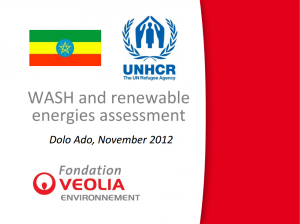
This document looks at drinking water, sanitation and renewable energy solutions and options in three camps in Dolo Odo with recommendations and conclusions.
- Tags: Solar Pumping and Value for Money. Organisations: Veolia Foundation.
Implementing Urine Diversion Dry Toilets in Dolo Addo, Ethiopia (UNHCR, OXFAM GB and CDC, 2014)
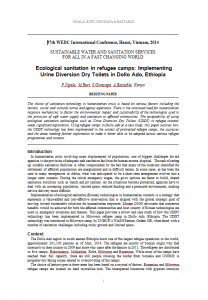
The choice of sanitation technology in humanitarian crisis is based on various factors including the terrain, social and cultural norms and agency experience. There is the continued need for humanitarian response mechanisms to factor the environmental impact and sustainability of the technologies used in the provision of safe water supply and sanitation to affected communities. The acceptability of using ecological sanitation technologies such as Urine Diversion Dry Toilets (UDDT) in refugee contexts needs significant exploration. Using refugee camps in Dollo Ado as a case study, this paper outlines how the UDDT technology has been implemented in the context of protracted refugee camps, the successes and the areas needing further exploration to make it better able to be adopted across various refugee programmes and contexts.
Improving Sanitation in Refugee Camps (UNHCR and Boston Consulting Group, 2015)
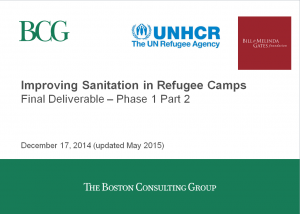
The report examines the feasibility of a wide range of standard sanitation technologies in addition to sanitation innovations in refugee contexts (including miniaturized biogas, reinvented toilets, new processor technologies, SMS dispatching, pay per use toilets, sale of by-products). Technologies were evaluated based on upfront investment cost; technology viability, suitable size and transportability; flexibility and resilience; and value for money.
- Organisations: BCG. Categories: WASH Research Documents, WASH Research Documents, and WASH Research Documents.
F-901/2015a UNHCR Excreta Management Assessment Tool (UNHCR, 2015)
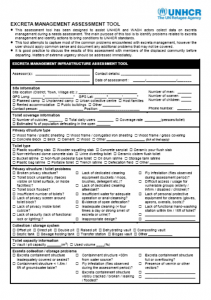
This assessment tool has been designed to assist UNHCR and WASH actors collect data on excreta management during a needs assessment. The main purpose of this tool is to identify problems related to excreta management and identify actions to bring conditions to UNHCR standards.
- Categories: WASH Blank Forms, WASH Emergency Guidelines, WASH Emergency Guidelines, and WASH Emergency Tools.
UNHCR WASH Manual – Preliminary Version (UNHCR, 2015)
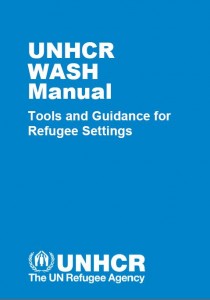
The UNHCR WASH Manual is a comprehensive and authoritative reference document for WASH interventions in refugee settings, built upon the experience of UNHCR and WASH organisations.
- Tags: Bathing Facilities, Bloody Diarrhoea, Boreholes, Bulk Water Treatment, Child Friendly Facilities, Communal Toilets, Communal Toilets, Communal Toilets, Communal Toilets, Communicable Disease Control, Community Led Total Sanitation (CLTS), Cross Cutting, Desludging and Excreta Transportation, Desludging and Excreta Transportation, Desludging and Excreta Transportation, Desludging and Excreta Transportation, Disability, Disease Vector Control, Drainage, Drilling, Excreta / Urine ReUse, Excreta / Urine ReUse, Excreta / Urine ReUse, Excreta / Urine ReUse, Excreta / Urine ReUse, Excreta / Urine ReUse, Excreta / Urine ReUse, Excreta / Urine ReUse, Excreta Management, Excreta Management, Excreta Management, Excreta Management, Excreta Management, Excreta Management, Excreta Management, Excreta Management, Excreta Treatment, Excreta Treatment, Excreta Treatment, Excreta Treatment, Excreta Treatment, Excreta Treatment, Gender, Grey Water Disposal, Hand Dug Wells, Handpumps, Handwashing with Soap, Household Toilets, Household Toilets, Household Toilets, Household Toilets, Household Toilets, Household Water Treatment, Human Right to Water / Sanitation, Hygiene Behaviour Change, Hygiene Promotion, Landfill Management, Laundering Facilities, Malaria, Medical Waste Management, Menstruation Hygiene Management, Piped Water Networks, Protection, Public Health, Rainwater Harvesting, Sewerage and Excreta Conveyance, Sewerage and Excreta Conveyance, Sewerage and Excreta Conveyance, Sewerage and Excreta Conveyance, Solid Waste Management, Spring Protection, WASH Assessments, WASH Assessments, WASH Assessments, WASH Coordination, WASH Monitoring, WASH Monitoring, WASH Monitoring, WASH Programme Health and Safety, WASH Programme Management, WASH Programme Management, Waste Recycling , Reuse and Reduction, Water Prospection and Investigation, Water Pumping, Water Quality Testing and Surveillance, Water Safety Plans, Water Storage, Water Supply, Water Supply, Water Tankering, and Watery Diarrhoea. Languages: English, English, English, English, English, English, English, and English. Organisations: UNHCR, UNHCR, UNHCR, UNHCR, UNHCR, UNHCR, and UNHCR. Categories: WASH Reference Documents, WASH Reference Documents, WASH Reference Documents, WASH Reference Documents, WASH Reference Documents, WASH Reference Documents, WASH Reference Documents, and WASH Reference Documents.
 English
English
